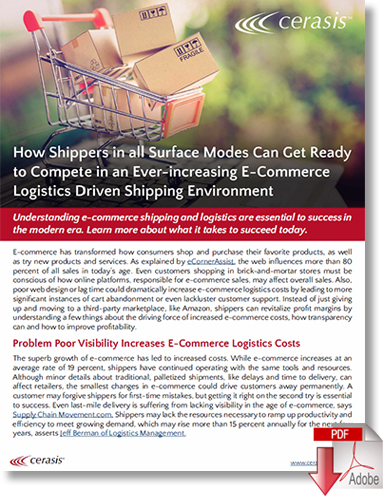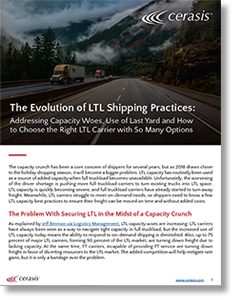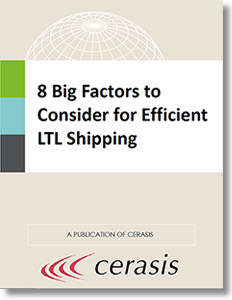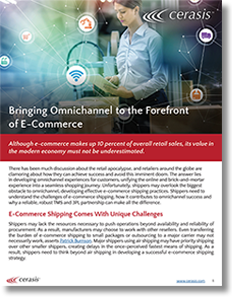Developing a Less-than-Truckload & Ecommerce Focused Shipping Strategy

Companies must embrace the combined nature of omnichannel to realize its benefits, and the same is true of combined less-than-truckload and e-commerce shipping strategies.
Omnichannel v Siloed Channels
Omnichannel is “in.” Siloed channels are out.
Customers expect to get whatever they want, whenever they want, at the prices they want and the ability to change their minds up to the delivery time.
It sounds like a shipping nightmare, and in some respects, it is.
Shippers cannot hope to fulfill every possible demand at all times, but they can help ensure positive experiences.
This will require a less-than-truckload (LTL) and e-commerce focused shipping strategy.
In other words, shippers will need to combine their approaches to handling e-commerce and LTL.
Shippers need to know the benefits of combined strategy and a few best practices to develop a winning LTL and e-commerce plan.
Benefits of Combining LTL and E-Commerce Shipping Strategies
Omnichannel means the ability to serve customers across any channel and blend all channels to create seamless experiences for customers.
Up to 60 percent of all transactions, including online and brick-and-mortar sales, involve the use of the internet at some point in the shopping journey.
As a result, companies must embrace the combined nature of omnichannel to realize its benefits, and the same is true of combined LTL and e-commerce shipping strategies.
Some of the top benefits of combined LTL and e-commerce include:
- More time for customer service and filling orders.
- Reduced paperwork errors.
- Increased accuracy in freight quoting, reducing accessorial or after-the-fact fees.
- Efficient processes.
- More revenue for customers.
- Lowered carrying costs through additional shipping models.
- REDUCED FREIGHT SPEND.
Best Practices in an LTL and E-Commerce Shipping Strategy
Gaining the benefits of omnichannel-based LTL and e-commerce is excellent, but the path to full realization is not necessarily clear.
Shippers should follow these best practices to create a comprehensive, cost-saving strategy:
- Refine LTL and e-commerce solutions’ provider bidding practices. How shippers submit RFPs to carriers and solicit new services can have a significant impact on pricing and timeliness of response. Since time is everything in the capacity crunch, those that refine processes by advising of expectations in the RFP and defining the review process can streamline carrier expansion.
- Expand LTL transportation networks. Using multiple carriers is likely the best and only way to access a global customer base in the age of e-commerce. Shipments outside of a carrier’s designated area will naturally require another carrier, and the global market of e-commerce means every option must be on the table. The alternative is to refuse sales or delivery to certain areas.
- Integrate LTL and e-commerce freight management platforms, explains Deborah Lockridge of Trucking Info. Integrated platforms had the natural effect of self-verifying information and automating the freight tender process. Moreover, nbsp;integrated solutions provide better traceability and reduced costs than trying to manage multiple systems independently. Shippers should also integrate the ELD and labor management systems to gain true end-to-end visibility, as well as the whole scope of warehouse management technologies and platforms.
- Consider DIM pricing. Dimensionalizers automatically measure freight to ensure dimensions are within the carrier limitations, as well as provide information for calculating DIM weight versus actual weight.
- Remember the impact of tariffs and new taxes. Although the Tax Cuts and Jobs Act was passed in early 2018, the likelihood of new taxes and tariffs levied in the coming year is great. Shippers should consider the impact of tariffs and potential changes to laws in making all decisions.
- Maximize efficiency by eliminating empty backhauls, asserts Supply Chain 24/7. Empty backhauls are wasted space and lost money. It’s that simple.
- Partner with a freight broker, like a 3PL. Freight brokers can help SMBs access volume discounts, expand carrier selection, take advantage of value-added services, such as invoice auditing and even cargo insurance.
Putting It All Together
Shippers have to meet e-commerce customers’ needs.
Delivering as expected will require the use of new technologies and convergence of LTL and e-commerce management platforms.
Shippers should follow the tips listed above to bring harmony to their systems and streamline shipment processing.
Of course, shippers must also work to build positive experiences for customers up to delivery, installation and customer service, if necessary.
In a sense, the reputation of less than truckload service has evolved and grown more important, especially in the age of social media.
Related: Applying Vital Less-than-Truckload Capacity Best Practices When Freight Volume is Tight
Related LTL & Ecommerce White Papers
The Evolution of LTL Shipping Best Practices New!
This exclusive, & educational white paper is for shippers who are accustomed to shipping LTL freight or are starting to ship more LTL freight, it addresses capacity woes, use of last-mile delivery, and how to choose the right LTL carrier. Download Now!
Current Factors Driving the Less Than Truckload Pricing Market New!
This white paper is a must-read for shippers who are seeking information on the less than truckload pricing market in order to plan for 2019. Download Now!
The State of & Pricing Outlook of the Less than Truckload Shipping Market
This is a must-read for shippers who are either LTL shipping pros, new LTL shippers who are needing education, or those moving more freight to the LTL mode as Full Truckload feels the capacity crunch squeeze. Download Now!
8 Big Factors to Consider for Efficient Less-than-Truckload Shipping
In this all-new e-book, we discuss the 8 core areas that Less-than-Truckload shippers can focus on in order to have more efficient LTL shipping practices. Download Now!
Acing the E-Commerce and Logistics Game Means Going Back to the Basics with an Eye on the Future
In this white paper, you will learn what supply chain leaders need to understand why logistics fundamentals will continue to shape the e-commerce shipping strategy and how to master e-commerce logistics. Download Now!
Bringing Omnichannel to the Forefront of Ecommerce
This white paper is a must read for those who are looking to go omnichannel with their supply chain and want to understand that a major part of that strategy is in the ecommerce channel. Download Now!
More Resources from Cerasis
Article Topics
Cerasis News & Resources
GlobalTranz Appoints Executive Chairman Bob Farrell as Chief Executive Officer Amazon’s Drone Delivery Hits Milestone with Federal Aviation Administration Clearance Digital Supply Chain: The Landscape, Trends, Types, and the Application in Supply Chain Management Walmart’s Bid for TikTok Could Benefit the Retail Giant’s Ecommerce and Advertising Businesses The State of Ecommerce Logistics Heading into 2020 Peak Delivery Season Bringing Omnichannel to the Forefront of Ecommerce FedEx’s Fred Smith Optimistic About Economic Recovery as Ecommerce Business Booms More CerasisLatest in Transportation
Amazon Logistics’ Growth Shakes Up Shipping Industry in 2023 Nissan Channels Tesla With Its Latest Manufacturing Process Why are Diesel Prices Climbing Back Over $4 a Gallon? Luxury Car Brands in Limbo After Chinese Company Violates Labor Laws The Three Biggest Challenges Facing Shippers and Carriers in 2024 Supply Chain Stability Index: “Tremendous Improvement” in 2023 Trucking Association CEO on New Biden Policy: ‘Entirely Unachievable’ More Transportation





















